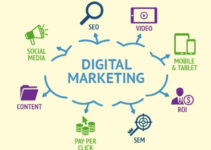Social media, the internet, and digitalization have made the e-commerce and online business environment highly competitive. Nowadays, businesses and companies have to partner up with third parties for the promotion of their products and services. Today, we’ll discuss what is affiliate marketing; its types, advantages, disadvantages, and examples of affiliate companies.
What is Affiliate Marketing?
Affiliate marketing is a form of advertisement model in which businesses and companies partner up and compensate 3rd party publishers to generate traffic and lead or refer it to the company’s product or service. The 3rd party publishers are the affiliates, and they promote the company’s product or service for incentives and commission fees.
Cookies, analytics, and the digital market have established the billion-dollar industry of affiliates marketing. Usually, companies offer a commission to the affiliates per sale rather than impressions and clicks.
Detailed Explanation
The internet market and e-commerce businesses have amplified the significance of online businesses. Amazon has made the affiliates market programs widely popular; bloggers add the Amazon affiliates link to their product reviewed pages; they receive their commission when someone buys anything by using the link.
In other words, we can say affiliates market is a pay-for-performance program when you outsource the activity of selling across the network. For instance, a company running the affiliates market programs could evaluate the performance of links that are generating the leads; it helps the company to check the convert to sale ratio.
An e-commerce platform plans to reach a wide range of shoppers and customers, and it hires and partners up with affiliates. Those affiliates may be the owner of email marketing lists, access to the wider network, or the owner of various websites. The affiliates would promote the products of the e-commerce store to its network of people. However, they do so by sending emails to their clients, posting links on their websites, text ads, and banner ads. Companies employ images, videos, and articles to attract the attention of customers.
When visitors click on the affiliates link and visit the e-commerce store; the affiliates partner receives the pre-decided commission (5% or 10% of the sale) from the e-commerce if shoppers buy anything from the store.
Types of Affiliate Marketing
Some of the main three types of affiliate marketing are as follows;
Unattached Affiliate Marketing
It is a form of advertisement model in which affiliates have got no connection to the product or service they’re promoting or communicating. They have got no relevant expertise and skills, authority, or make any claim about its usage. You can say that it’s the most uninvolved type of affiliates market program. They have got a limited attachment to products and the potential customers whether to advise or recommend the product.
Involved Affiliate Marketing
It is the type of affiliates market program in which affiliates have got some type of relationship to the product or service they’re promoting. Generally, the relationship or the connection is between the product or service and the niche of affiliates. They have got sufficient expertise, influence, trusted source, and authority to generate traffic and leads. However, they don’t make claims about the usage of the product.
Related Affiliate Marketing
It is a type of affiliates market program in which affiliates have got a deeper connection to the product or service they’re promoting. They only use the product and are confident that it would deliver a positive experience, and others would share it. However, they act as the trusted source of information and advertisement. Since they recommend the product as a trusted source, if any types of problems arise in the product, it would jeopardize their reputation.
Advantages & Disadvantages of Affiliate Marketing
Low Cost
Affiliate marketing offers a great result both to the e-commerce platform and the affiliates marketers. The cost of advertising through affiliates is very low, and they employ creating advertising and promotional techniques and they get incentives and commission by doing it. However, the ROI through affiliates program is very high for the company, and it amplifies the conversion to sale rate. Offering incentives and commission is the cost of advertisement to the company.
Payment for Qualified Lead
Companies used to pay earlier for the ads banner, an impression (cost per mile), traffic, or cost per click. Technology has helped companies to offer commissions only for qualified leads or for the sale.
Vulnerable to Fraud
However, the affiliates programs could be risky because some hackers could generate impressions and leads through software. That’s why many affiliates offering programs companies have revised their terms and conditions for generating leads and impressions. Some of the banned methods are;
- Redirecting and referring all the search queries to the affiliate page
- Installing spyware or adware
Possible Risk Factor
The affiliates program could deliver you better results if you clearly and carefully devise the terms and conditions. For instance, you should clearly spell out in the affiliates program contract that the commission is for the sale and not for the leads or impression. If you’re offering a commission for the leads, then the risk for fraud is much higher.
Examples of Affiliate Marketing
Etsy Affiliate Marketing
Etsy is a very popular platform for unique and rare items and vintage products; the platform promotes its offers through affiliates partners and other channels. If you want to apply, then you should fill out the form on the Etsy affiliates program portal. In order to qualify for the Etsy affiliates partners programs, you should have a unique brand, domain, active, and meet other criteria.
If you get approved, Etsy would pay you a commission for the sale that you generate for the promotions of its products. The commission and incentives are different for different types of products. However, the sellers on Etsy can be affiliates, but they can’t earn commission on the sales of their own products.
Buzzfeed
Buzzfeed is a digital media company in New York and the company has earned a reputation through product reviews, quizzes, entertainment news, and viral stories. The shopping area of the company offers reviews and features different products and services of the partners. People would read the reviews of the product and click on the affiliates link to buy the product. The company would earn a commission from every sale generated from its reviews.
Conclusion: What is Affiliate Marketing? Types, Pros & Cons, Examples
After an in-depth study of what is affiliate marketing; its types, advantages, disadvantages, and examples; we have realized that affiliates programs are beneficial for the company. If you’re planning to launch it for your company, then you should keep in mind its types and pros and cons and choose the most suitable for your company.

Ahsan Ali Shaw is an accomplished Business Writer, Analyst, and Public Speaker. Other than that, he’s a fun loving person.


